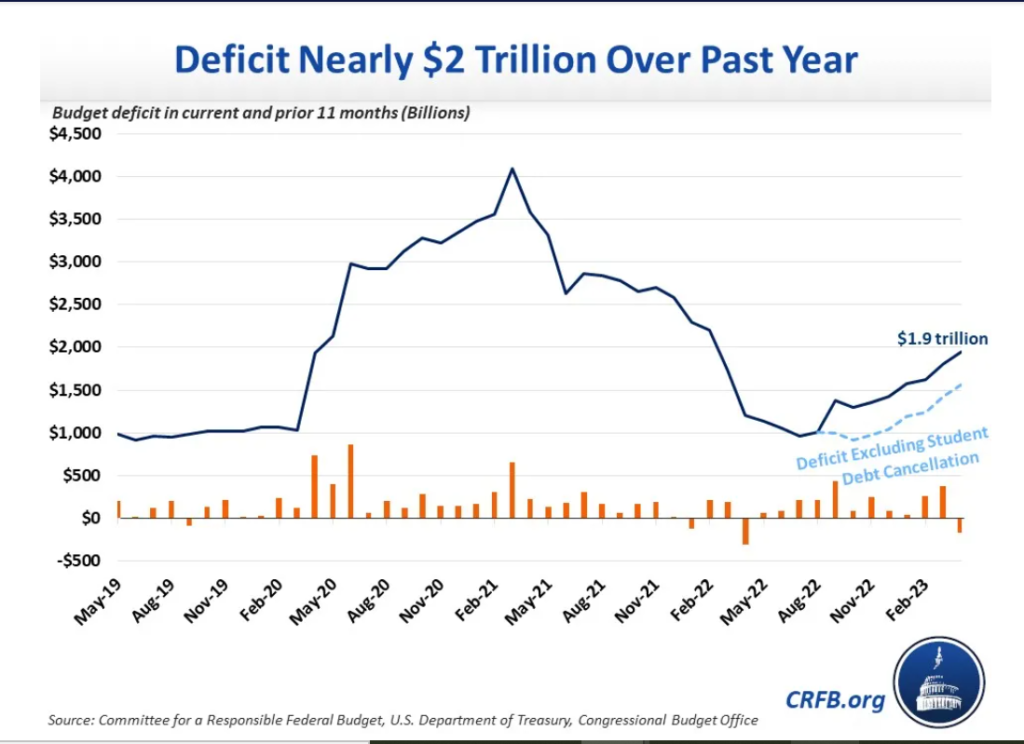
In a speech delivered one year ago this week, President Joe Biden took credit for what he called “the largest drop ever” in the federal budget deficit.
“Let me remind you again: I reduced the federal deficit,” Biden said. “All the talk about the deficit from my Republican friends, I love it. I’ve reduced $350 billion in my first year in office. And we’re on track to reduce it by the end of September by another 1 trillion 500 billion dollars—the largest drop ever.”
As Reason—and others in the media—pointed out, this was a wild exaggeration. Biden had done nothing to reduce the deficit. In fact, policies enacted since he’d taken office had caused the federal government to borrow more, not less, than it otherwise would have. The lower federal deficit total in 2022 relative to the two previous years resulted from expiring one-time emergency expenditures during the COVID-19 pandemic, which had swelled the deficit to record highs.
In short, 2022 was a major outlier from the trend of growing budget deficits—a trend that had started before the pandemic and that was projected to reemerge after the tsunami of federal pandemic borrowing had passed. “The deficit will begin rising again next year and will rise faster and higher than it would have before Biden took office,” I wrote in June of last year.
Well, the deficit is rising again.
Rising spending and lower-than-expected tax collections over the first seven months of the federal government’s fiscal year (which began on October 1) have caused the budget deficit to hit $928 billion so far, according to the Congressional Budget Office’s (CBO) latest monthly report. That’s nearly three times larger than the $360 billion deficit recorded during the same seven months in the previous fiscal year.
Net tax collections are down about 10 percent compared to last year, the CBO notes, while spending has increased by about 8 percent. That’s a recipe for a growing deficit, which is ultimately nothing more than the gap between how much the government spends and how much it collects in taxes. The gap is only going to keep growing in future years, according to the CBO’s long-term projections.
The Committee for a Responsible Federal Budget, a nonprofit that advocates for small deficits, points out that the federal government has rung up a deficit of nearly $2 trillion over the past 12 months. “High and rising deficits put more pressure on inflation, make the Federal Reserve’s inflation-fighting efforts more challenging and costly, slow economic growth, make it harder to respond to new emergencies, create geopolitical risks, and put the national debt on an unsustainable long-term path,” the group warns.
Those rising deficits and the potential economic consequences of the United States’ unsustainable pile of debt provide a stark backdrop for this afternoon’s meeting at the White House between Biden and Speaker of the House Kevin McCarthy (R–Calif.). It’s the first face-to-face meeting in months for the two leaders who will be responsible for averting a potential default on the federal debt, which could come as soon as June 1 unless Congress acts to raise the Treasury Department’s borrowing limit.
While the debt ceiling is the most accurate crisis at the moment, the growing gap between how much the government spends and what it collects in taxes must be part of the discussion—even though Biden and other Democrats want to keep the issues separate. Raising the debt limit will accomplish nothing of substance unless the wildly out-of-whack federal budget is meaningfully addressed too. That means cutting spending, as the House-passed debt limit proposal aims to do.
A year ago, Biden was eager to talk about the federal budget deficit—his claim about cutting the deficit was not an offhand remark but a central talking point for months—because he could use the apparently smaller deficit to justify his plans to spend and borrow more.
Now that the deficit is raising again—and on pace to keep rising for the foreseeable future—it’s unlikely Biden will be pointing to it when he meets with McCarthy this afternoon. Unsurprisingly, Biden’s interest in deficit reduction was more about political opportunism than fiscal responsibility.



